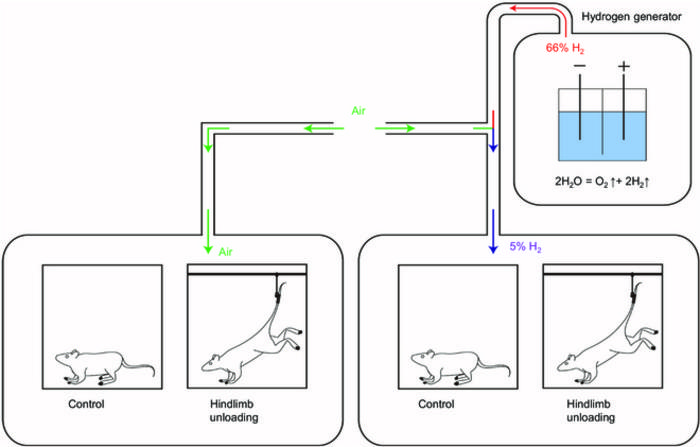Astronauts are affected by various physical and chemical factors during spaceflight, resulting in a series of pathological and physiological changes. Many studies have shown that spaceflight causes oxidative stress and induces brain disorder in astronauts, negatively affecting neuronal function and brain structure. However, the underlying mechanisms and the countermeasures need to be further explored. Moreover, it is observed that hydrogen has preventative and curative effects on ischemia–reperfusion injury, ionizing radiation injury, inflammatory diseases, and metabolic and neurodegenerative diseases. Increasing evidence demonstrated that hydrogen can act as a therapeutic antioxidant. In a research paper recently published in Space: Science & Technology, authors from China Astronaut Research and Training Center, Beijing, China, Beijing University of Technology, Beijing, China, and National Institutes of Health, Baltimore, MD, USA, together carry out a research to confirm the protective effect of hydrogen inhalation on declining brain function under hindlimb unloading conditions and disclose the underlying mechanism, which provides a potential strategy for astronauts’ health.

Credit: Space: Science & Technology
Astronauts are affected by various physical and chemical factors during spaceflight, resulting in a series of pathological and physiological changes. Many studies have shown that spaceflight causes oxidative stress and induces brain disorder in astronauts, negatively affecting neuronal function and brain structure. However, the underlying mechanisms and the countermeasures need to be further explored. Moreover, it is observed that hydrogen has preventative and curative effects on ischemia–reperfusion injury, ionizing radiation injury, inflammatory diseases, and metabolic and neurodegenerative diseases. Increasing evidence demonstrated that hydrogen can act as a therapeutic antioxidant. In a research paper recently published in Space: Science & Technology, authors from China Astronaut Research and Training Center, Beijing, China, Beijing University of Technology, Beijing, China, and National Institutes of Health, Baltimore, MD, USA, together carry out a research to confirm the protective effect of hydrogen inhalation on declining brain function under hindlimb unloading conditions and disclose the underlying mechanism, which provides a potential strategy for astronauts’ health.
First, authors explain the experiment materials and methods. In the experiment, specific pathogen-free (SPF) facility Sprague-Dawley male rats are purchased from Experiment Animal Center of Wei Tong Li Hua (Beijing, China) and are maintained at the SPF facility of China Astronaut Research and Training Center in SPF with 12-h light/dark cycle at ambient temperature and humidity and fed a standard chow diet. After 7 d, the rats are randomly divided into 4 groups: 1) control (Ctrl) group, where rats were kept under normal conditions; 2) Ctrl + H2 group, where rats were treated with about 5% hydrogen under normal conditions for 90 min each time, 2 times per day; 3) HU, where rats were treated with hindlimb unloading; and 4) HU + H2 group, rats were treated with about 5% hydrogen under hindlimb unloading conditions for 90 min each time, 2 times per day. The 5% H2 is obtained by mixing the H2–O2 (66% hydrogen and 33% oxygen) generated by the hydrogen/oxygen generator and air. All the animal experiments were approved by the Committees of Animal Ethics and Experimental Safety of the China Astronaut Research and Training Center (reference number: ACC-IACUC-2020-006). After 28 d of hindlimb unloading, behavioral assessments, neurotransmitter level analysis, histological analysis, assays for GSSG, GSH, MDA, SOD, and CAT, targeted metabolite profiling, mRNA sequencing, RNA extraction and real-time PCR, western blotting, and statistical analysis are performed.
Then, authors present their experiment analysis results. The results are summarized in to four points. (1) Hydrogen inhalation improved brain function and alleviated the pathological damage in hippocampus induced by hindlimb unloading. (2) Hydrogen inhalation ameliorated the level of oxidative stress induced by hindlimb unloading in rat brain. (3) Hydrogen inhalation ameliorated the perturbation in glucose metabolism induced by hindlimb unloading in rat brain. (4) The potential mechanism of hydrogen in ameliorating unloading-induced rat brain dysfunction: hindlimb unloading may induce cognitive defects via PGC-1α and BDNF by influencing the expression of RGS13, while H2 alleviated these effects.
Last, authors draw the conclusion. This study suggests that hydrogen plays a protective role in hindlimb-unloading-induced brain damage, which is closely related with the obvious effect of hydrogen treatment in alleviating antioxidant activities and regulation on glucose metabolism. The changes of PGC-1α and BDNF, the key regulators of metabolism and brain function, are probably involved in this process. The underlying mechanism need to be further explored. The function of hydrogen on brain protection provides a potential protective measure for astronauts during spaceflight.
Article Title: Hydrogen Inhalation Ameliorates Oxidative Stress and Glucose Metabolism Disorder in the Brain of Hindlimb Unloading Rats
Journal: Space: Science & Technology
Authors: Xiaoyan Jin, Fei Xie, Yang Yi, Yating Zhang, Shukuan Ling, Qianwei shen, Xuemei Ma, and Yingxian Li*
Affiliation: State Key Laboratory of Space Medicine Fundamentals and Application, China Astronaut Research and Training Center, Beijing, China.
Journal
Space Science & Technology
DOI
10.34133/space.0027
Article Title
Hydrogen Inhalation Ameliorates Oxidative Stress and Glucose Metabolism Disorder in the Brain of Hindlimb Unloading Rats
Article Publication Date
29-Mar-2023




